The Nature of Leadership: An Analytical Study
VerifiedAdded on 2020/10/22
|16
|4817
|353
AI Summary
This assignment provides an analytical study of leadership styles, including transformational leadership, transactional leadership, and servant leadership. It explores the impact of leadership styles on organizational effectiveness and highlights the importance of servant leadership in today's business environment. The four team player styles - contributors, collaborators, communicators, and challengers - are also discussed, along with distributed leadership in action. The assignment draws from various sources, including academic journals, books, and research studies, to provide a comprehensive understanding of leadership and its role in organizational success.
Contribute Materials
Your contribution can guide someone’s learning journey. Share your
documents today.
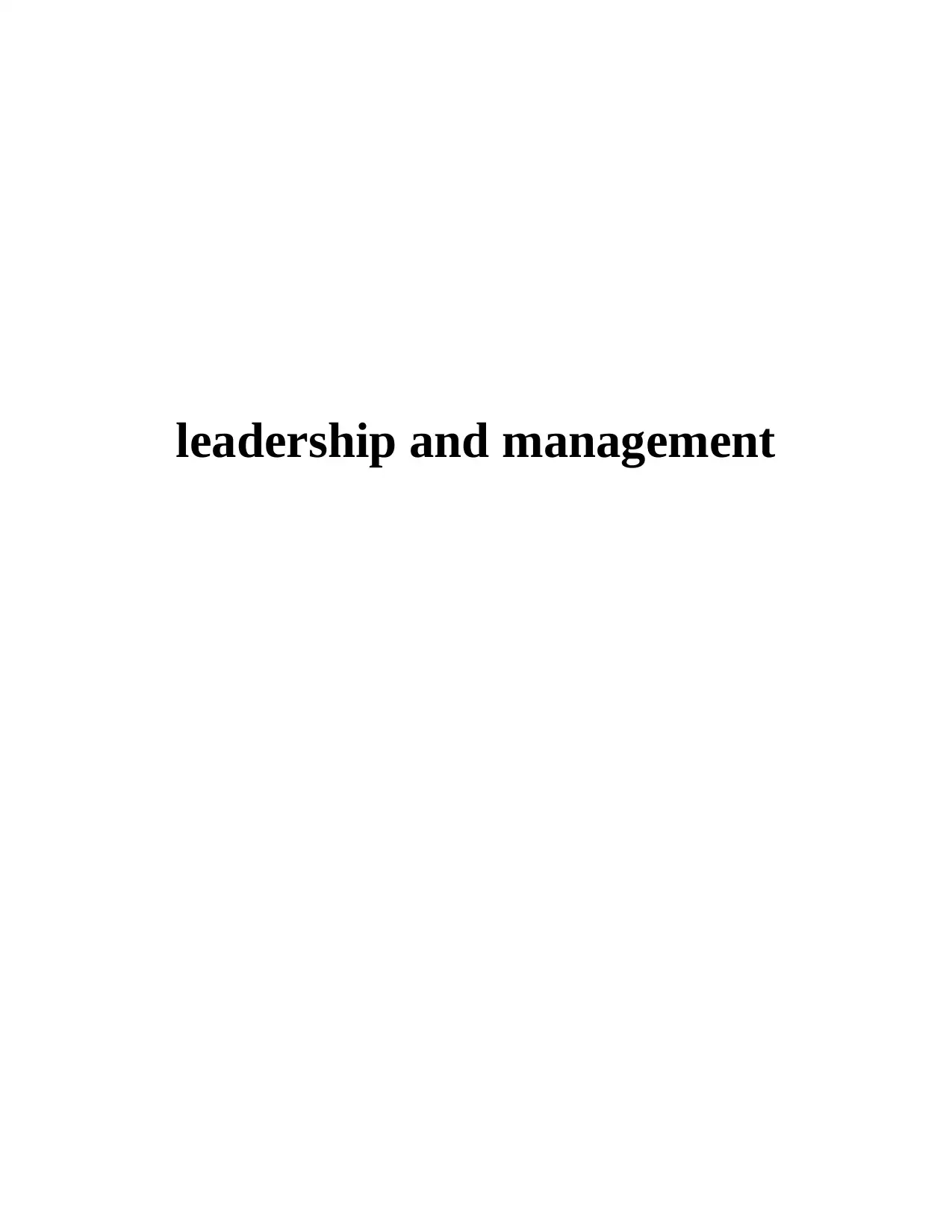
leadership and management
Secure Best Marks with AI Grader
Need help grading? Try our AI Grader for instant feedback on your assignments.
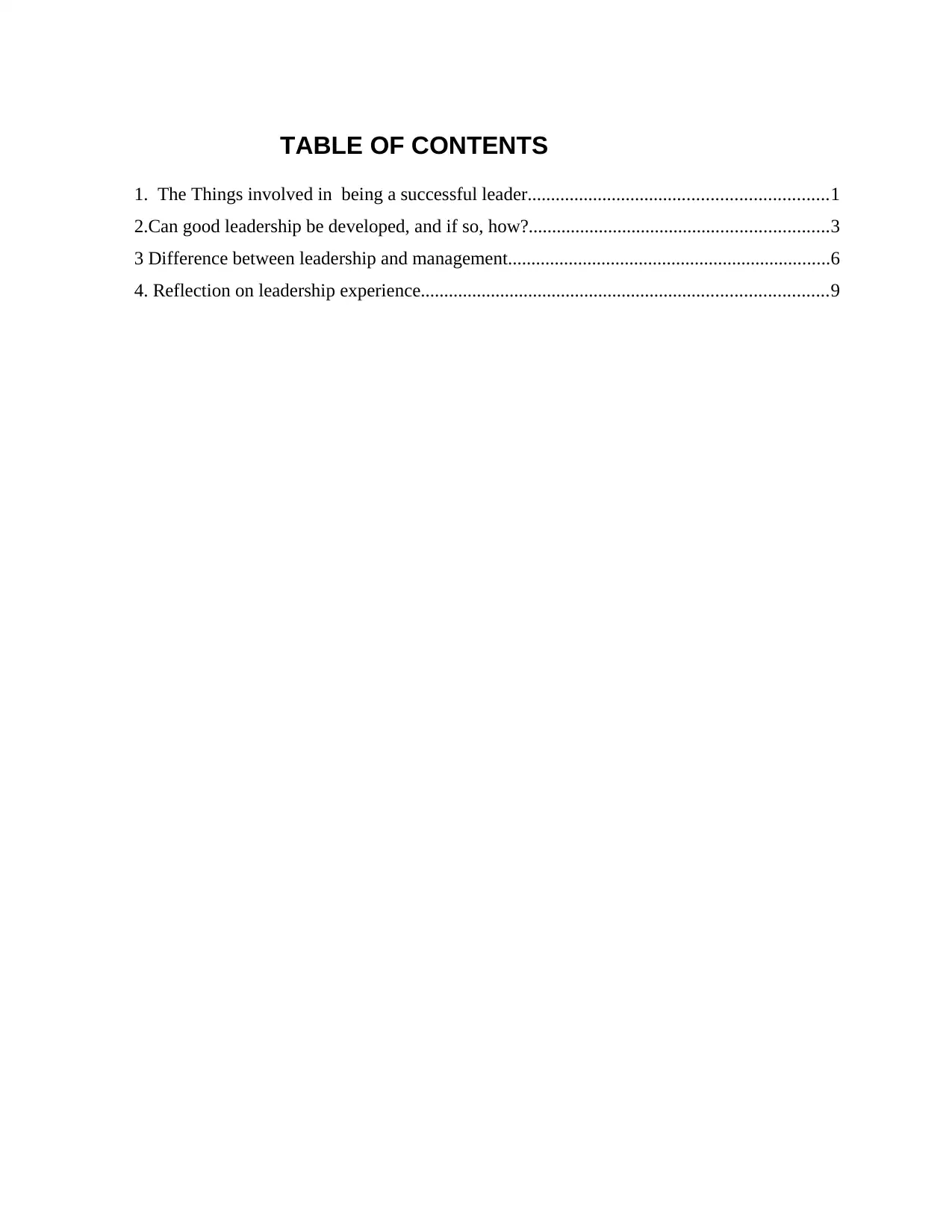
TABLE OF CONTENTS
1. The Things involved in being a successful leader................................................................1
2.Can good leadership be developed, and if so, how?................................................................3
3 Difference between leadership and management.....................................................................6
4. Reflection on leadership experience.......................................................................................9
1. The Things involved in being a successful leader................................................................1
2.Can good leadership be developed, and if so, how?................................................................3
3 Difference between leadership and management.....................................................................6
4. Reflection on leadership experience.......................................................................................9
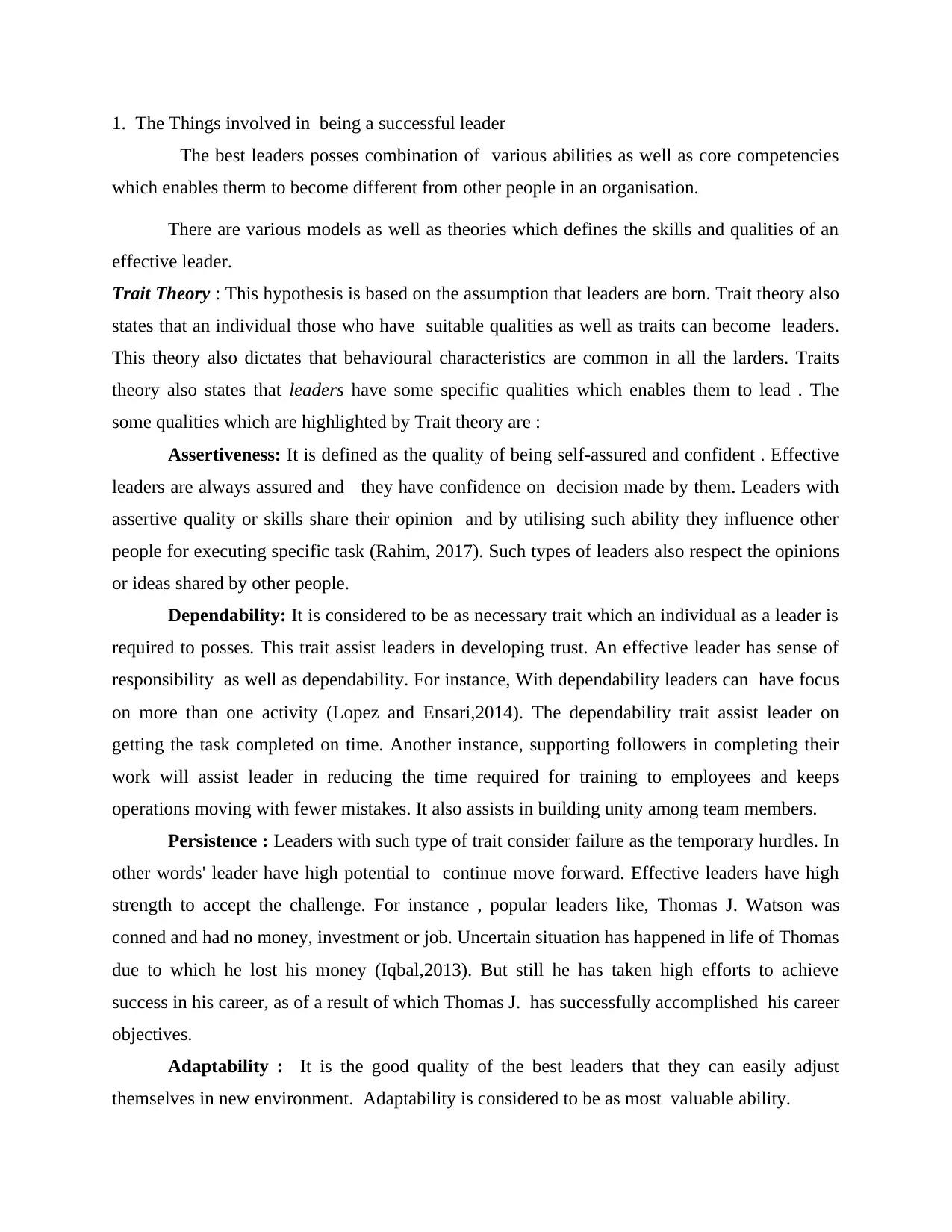
1. The Things involved in being a successful leader
The best leaders posses combination of various abilities as well as core competencies
which enables therm to become different from other people in an organisation.
There are various models as well as theories which defines the skills and qualities of an
effective leader.
Trait Theory : This hypothesis is based on the assumption that leaders are born. Trait theory also
states that an individual those who have suitable qualities as well as traits can become leaders.
This theory also dictates that behavioural characteristics are common in all the larders. Traits
theory also states that leaders have some specific qualities which enables them to lead . The
some qualities which are highlighted by Trait theory are :
Assertiveness: It is defined as the quality of being self-assured and confident . Effective
leaders are always assured and they have confidence on decision made by them. Leaders with
assertive quality or skills share their opinion and by utilising such ability they influence other
people for executing specific task (Rahim, 2017). Such types of leaders also respect the opinions
or ideas shared by other people.
Dependability: It is considered to be as necessary trait which an individual as a leader is
required to posses. This trait assist leaders in developing trust. An effective leader has sense of
responsibility as well as dependability. For instance, With dependability leaders can have focus
on more than one activity (Lopez and Ensari,2014). The dependability trait assist leader on
getting the task completed on time. Another instance, supporting followers in completing their
work will assist leader in reducing the time required for training to employees and keeps
operations moving with fewer mistakes. It also assists in building unity among team members.
Persistence : Leaders with such type of trait consider failure as the temporary hurdles. In
other words' leader have high potential to continue move forward. Effective leaders have high
strength to accept the challenge. For instance , popular leaders like, Thomas J. Watson was
conned and had no money, investment or job. Uncertain situation has happened in life of Thomas
due to which he lost his money (Iqbal,2013). But still he has taken high efforts to achieve
success in his career, as of a result of which Thomas J. has successfully accomplished his career
objectives.
Adaptability : It is the good quality of the best leaders that they can easily adjust
themselves in new environment. Adaptability is considered to be as most valuable ability.
The best leaders posses combination of various abilities as well as core competencies
which enables therm to become different from other people in an organisation.
There are various models as well as theories which defines the skills and qualities of an
effective leader.
Trait Theory : This hypothesis is based on the assumption that leaders are born. Trait theory also
states that an individual those who have suitable qualities as well as traits can become leaders.
This theory also dictates that behavioural characteristics are common in all the larders. Traits
theory also states that leaders have some specific qualities which enables them to lead . The
some qualities which are highlighted by Trait theory are :
Assertiveness: It is defined as the quality of being self-assured and confident . Effective
leaders are always assured and they have confidence on decision made by them. Leaders with
assertive quality or skills share their opinion and by utilising such ability they influence other
people for executing specific task (Rahim, 2017). Such types of leaders also respect the opinions
or ideas shared by other people.
Dependability: It is considered to be as necessary trait which an individual as a leader is
required to posses. This trait assist leaders in developing trust. An effective leader has sense of
responsibility as well as dependability. For instance, With dependability leaders can have focus
on more than one activity (Lopez and Ensari,2014). The dependability trait assist leader on
getting the task completed on time. Another instance, supporting followers in completing their
work will assist leader in reducing the time required for training to employees and keeps
operations moving with fewer mistakes. It also assists in building unity among team members.
Persistence : Leaders with such type of trait consider failure as the temporary hurdles. In
other words' leader have high potential to continue move forward. Effective leaders have high
strength to accept the challenge. For instance , popular leaders like, Thomas J. Watson was
conned and had no money, investment or job. Uncertain situation has happened in life of Thomas
due to which he lost his money (Iqbal,2013). But still he has taken high efforts to achieve
success in his career, as of a result of which Thomas J. has successfully accomplished his career
objectives.
Adaptability : It is the good quality of the best leaders that they can easily adjust
themselves in new environment. Adaptability is considered to be as most valuable ability.
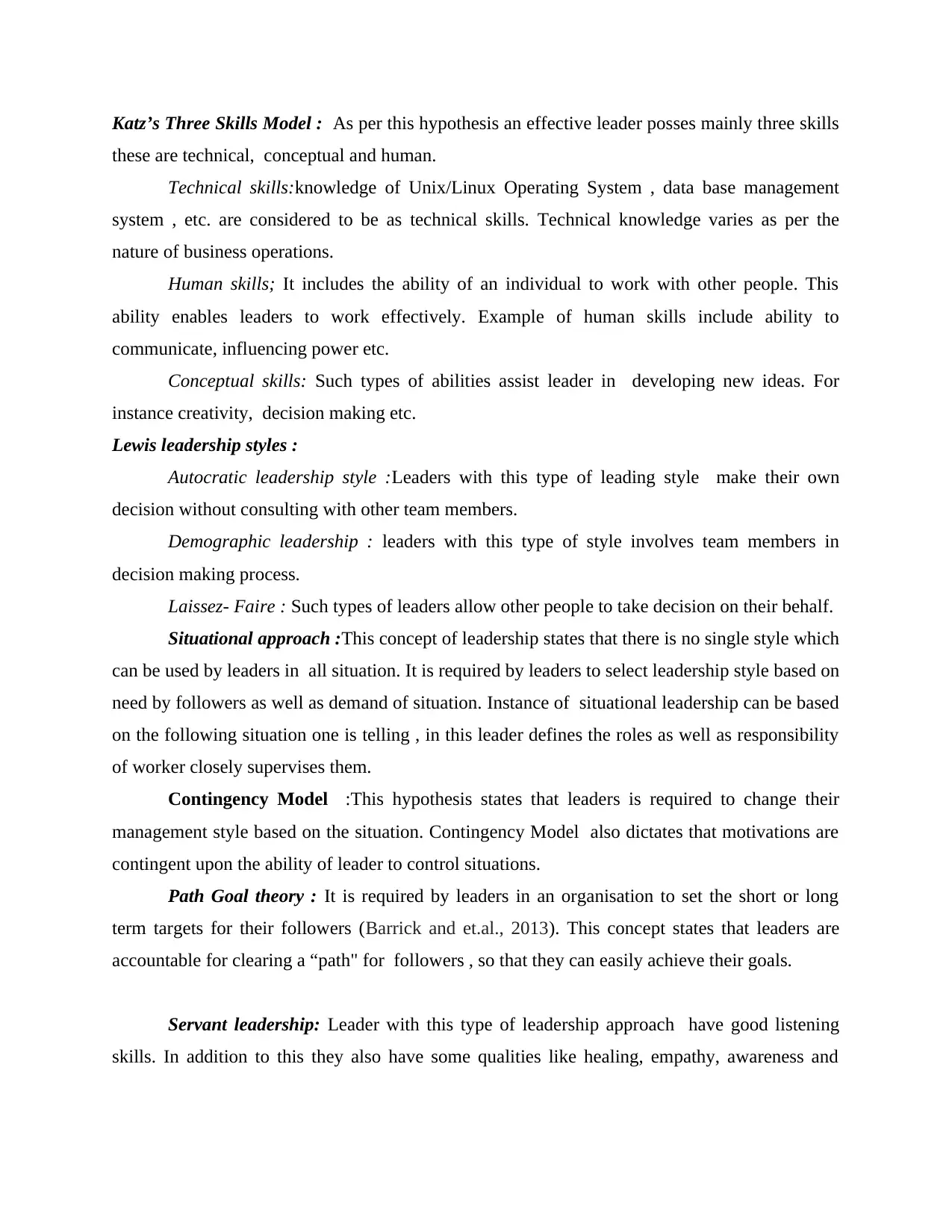
Katz’s Three Skills Model : As per this hypothesis an effective leader posses mainly three skills
these are technical, conceptual and human.
Technical skills:knowledge of Unix/Linux Operating System , data base management
system , etc. are considered to be as technical skills. Technical knowledge varies as per the
nature of business operations.
Human skills; It includes the ability of an individual to work with other people. This
ability enables leaders to work effectively. Example of human skills include ability to
communicate, influencing power etc.
Conceptual skills: Such types of abilities assist leader in developing new ideas. For
instance creativity, decision making etc.
Lewis leadership styles :
Autocratic leadership style :Leaders with this type of leading style make their own
decision without consulting with other team members.
Demographic leadership : leaders with this type of style involves team members in
decision making process.
Laissez- Faire : Such types of leaders allow other people to take decision on their behalf.
Situational approach :This concept of leadership states that there is no single style which
can be used by leaders in all situation. It is required by leaders to select leadership style based on
need by followers as well as demand of situation. Instance of situational leadership can be based
on the following situation one is telling , in this leader defines the roles as well as responsibility
of worker closely supervises them.
Contingency Model :This hypothesis states that leaders is required to change their
management style based on the situation. Contingency Model also dictates that motivations are
contingent upon the ability of leader to control situations.
Path Goal theory : It is required by leaders in an organisation to set the short or long
term targets for their followers (Barrick and et.al., 2013). This concept states that leaders are
accountable for clearing a “path" for followers , so that they can easily achieve their goals.
Servant leadership: Leader with this type of leadership approach have good listening
skills. In addition to this they also have some qualities like healing, empathy, awareness and
these are technical, conceptual and human.
Technical skills:knowledge of Unix/Linux Operating System , data base management
system , etc. are considered to be as technical skills. Technical knowledge varies as per the
nature of business operations.
Human skills; It includes the ability of an individual to work with other people. This
ability enables leaders to work effectively. Example of human skills include ability to
communicate, influencing power etc.
Conceptual skills: Such types of abilities assist leader in developing new ideas. For
instance creativity, decision making etc.
Lewis leadership styles :
Autocratic leadership style :Leaders with this type of leading style make their own
decision without consulting with other team members.
Demographic leadership : leaders with this type of style involves team members in
decision making process.
Laissez- Faire : Such types of leaders allow other people to take decision on their behalf.
Situational approach :This concept of leadership states that there is no single style which
can be used by leaders in all situation. It is required by leaders to select leadership style based on
need by followers as well as demand of situation. Instance of situational leadership can be based
on the following situation one is telling , in this leader defines the roles as well as responsibility
of worker closely supervises them.
Contingency Model :This hypothesis states that leaders is required to change their
management style based on the situation. Contingency Model also dictates that motivations are
contingent upon the ability of leader to control situations.
Path Goal theory : It is required by leaders in an organisation to set the short or long
term targets for their followers (Barrick and et.al., 2013). This concept states that leaders are
accountable for clearing a “path" for followers , so that they can easily achieve their goals.
Servant leadership: Leader with this type of leadership approach have good listening
skills. In addition to this they also have some qualities like healing, empathy, awareness and
Secure Best Marks with AI Grader
Need help grading? Try our AI Grader for instant feedback on your assignments.
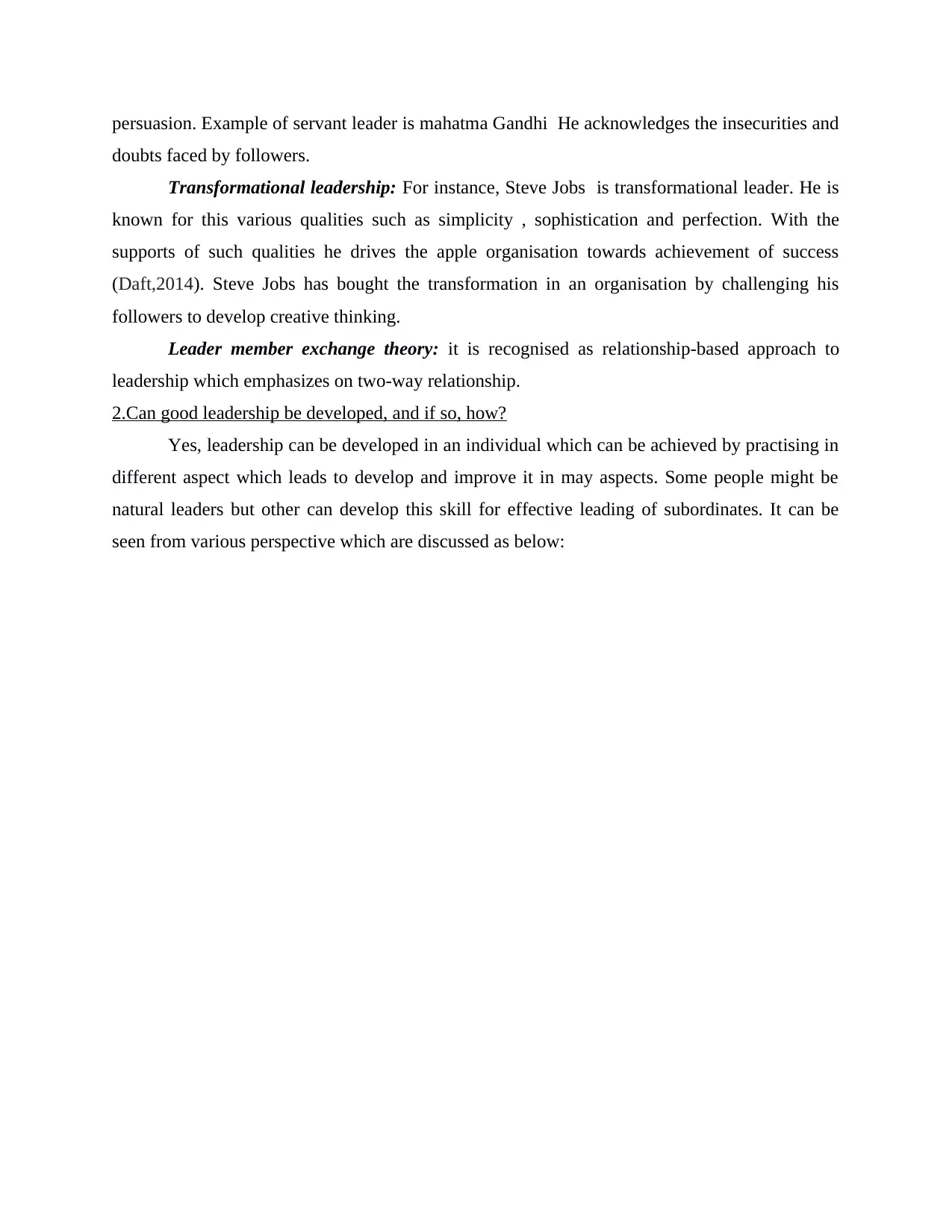
persuasion. Example of servant leader is mahatma Gandhi He acknowledges the insecurities and
doubts faced by followers.
Transformational leadership: For instance, Steve Jobs is transformational leader. He is
known for this various qualities such as simplicity , sophistication and perfection. With the
supports of such qualities he drives the apple organisation towards achievement of success
(Daft,2014). Steve Jobs has bought the transformation in an organisation by challenging his
followers to develop creative thinking.
Leader member exchange theory: it is recognised as relationship-based approach to
leadership which emphasizes on two-way relationship.
2.Can good leadership be developed, and if so, how?
Yes, leadership can be developed in an individual which can be achieved by practising in
different aspect which leads to develop and improve it in may aspects. Some people might be
natural leaders but other can develop this skill for effective leading of subordinates. It can be
seen from various perspective which are discussed as below:
doubts faced by followers.
Transformational leadership: For instance, Steve Jobs is transformational leader. He is
known for this various qualities such as simplicity , sophistication and perfection. With the
supports of such qualities he drives the apple organisation towards achievement of success
(Daft,2014). Steve Jobs has bought the transformation in an organisation by challenging his
followers to develop creative thinking.
Leader member exchange theory: it is recognised as relationship-based approach to
leadership which emphasizes on two-way relationship.
2.Can good leadership be developed, and if so, how?
Yes, leadership can be developed in an individual which can be achieved by practising in
different aspect which leads to develop and improve it in may aspects. Some people might be
natural leaders but other can develop this skill for effective leading of subordinates. It can be
seen from various perspective which are discussed as below:
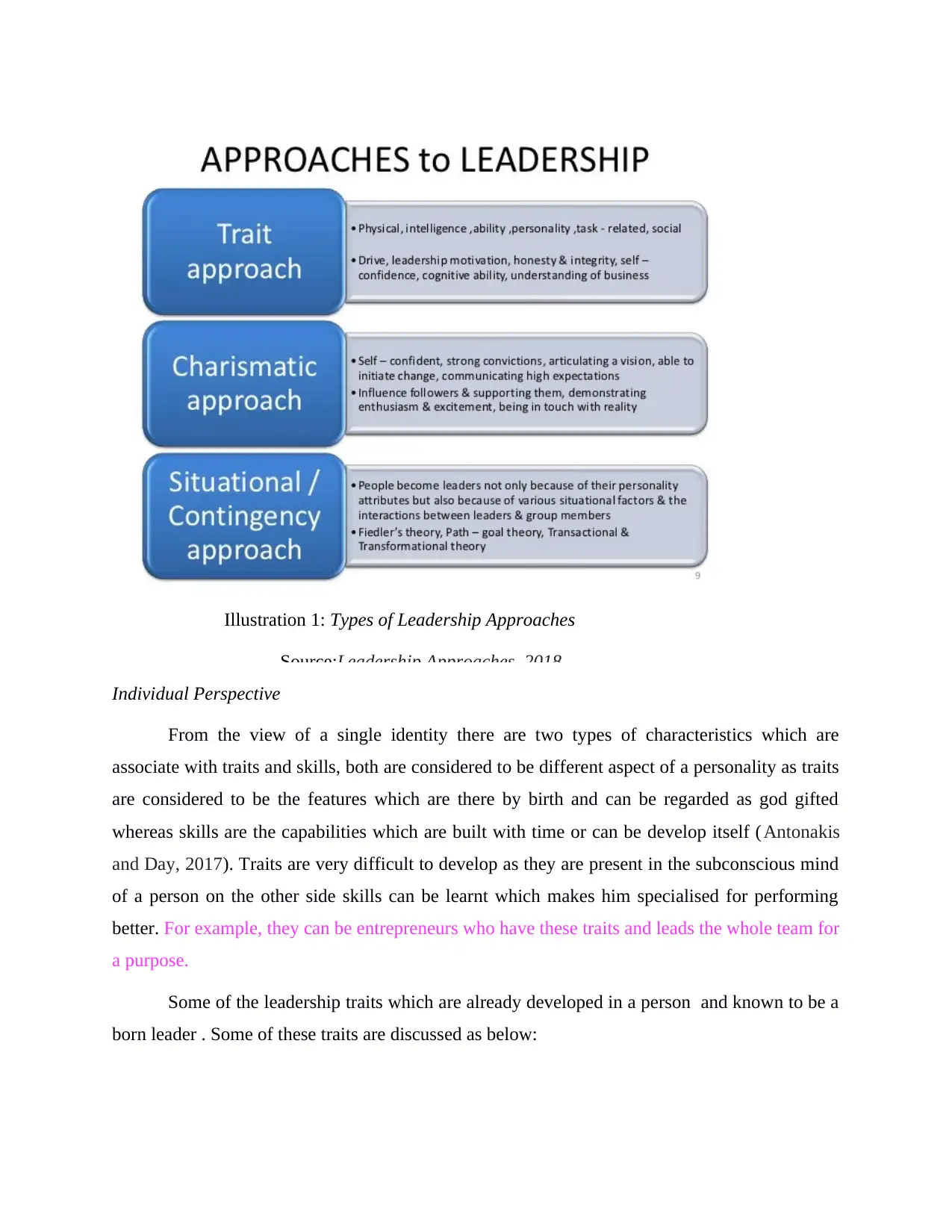
Illustration 1: Types of Leadership Approaches
Source:Leadership Approaches. 2018.
Individual Perspective
From the view of a single identity there are two types of characteristics which are
associate with traits and skills, both are considered to be different aspect of a personality as traits
are considered to be the features which are there by birth and can be regarded as god gifted
whereas skills are the capabilities which are built with time or can be develop itself (Antonakis
and Day, 2017). Traits are very difficult to develop as they are present in the subconscious mind
of a person on the other side skills can be learnt which makes him specialised for performing
better. For example, they can be entrepreneurs who have these traits and leads the whole team for
a purpose.
Some of the leadership traits which are already developed in a person and known to be a
born leader . Some of these traits are discussed as below:
Source:Leadership Approaches. 2018.
Individual Perspective
From the view of a single identity there are two types of characteristics which are
associate with traits and skills, both are considered to be different aspect of a personality as traits
are considered to be the features which are there by birth and can be regarded as god gifted
whereas skills are the capabilities which are built with time or can be develop itself (Antonakis
and Day, 2017). Traits are very difficult to develop as they are present in the subconscious mind
of a person on the other side skills can be learnt which makes him specialised for performing
better. For example, they can be entrepreneurs who have these traits and leads the whole team for
a purpose.
Some of the leadership traits which are already developed in a person and known to be a
born leader . Some of these traits are discussed as below:
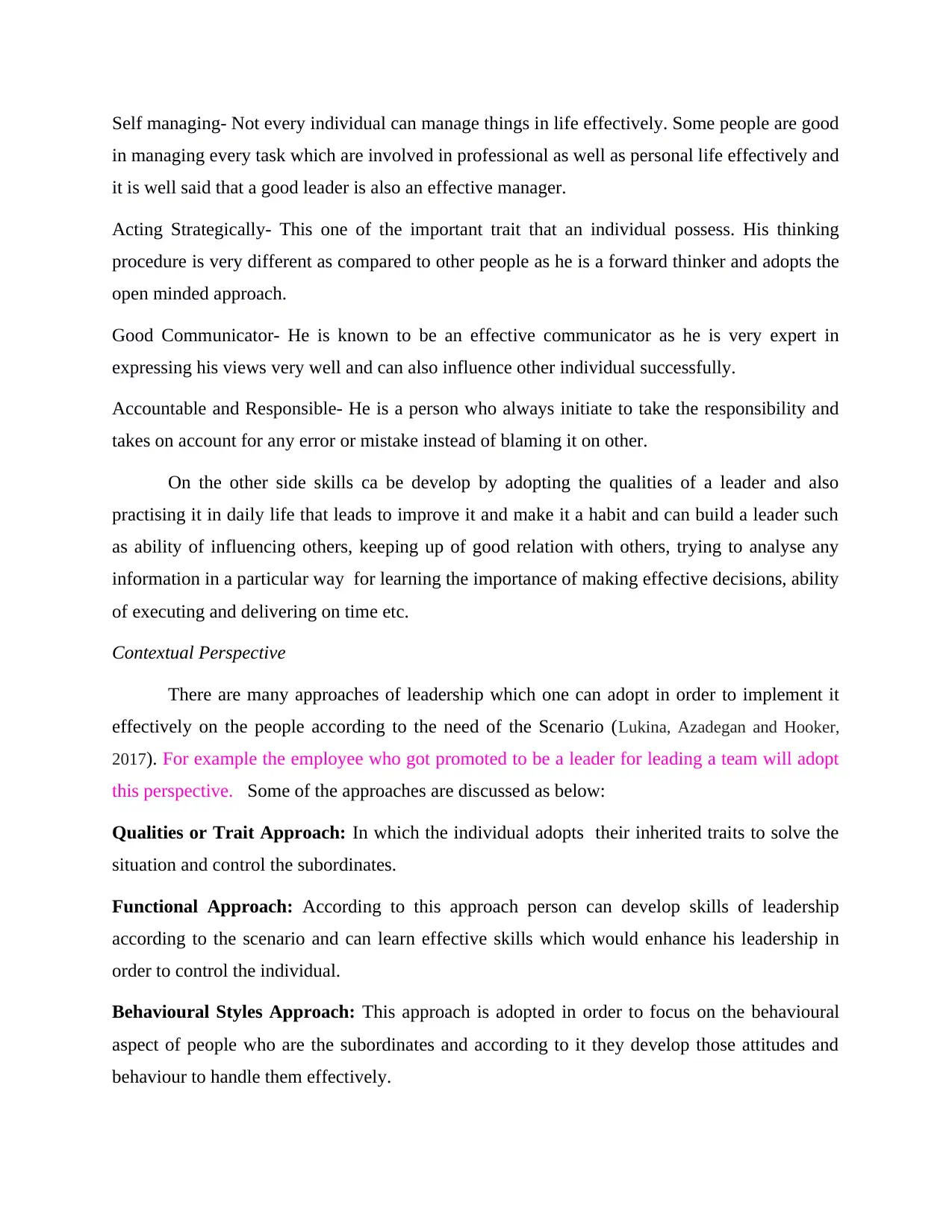
Self managing- Not every individual can manage things in life effectively. Some people are good
in managing every task which are involved in professional as well as personal life effectively and
it is well said that a good leader is also an effective manager.
Acting Strategically- This one of the important trait that an individual possess. His thinking
procedure is very different as compared to other people as he is a forward thinker and adopts the
open minded approach.
Good Communicator- He is known to be an effective communicator as he is very expert in
expressing his views very well and can also influence other individual successfully.
Accountable and Responsible- He is a person who always initiate to take the responsibility and
takes on account for any error or mistake instead of blaming it on other.
On the other side skills ca be develop by adopting the qualities of a leader and also
practising it in daily life that leads to improve it and make it a habit and can build a leader such
as ability of influencing others, keeping up of good relation with others, trying to analyse any
information in a particular way for learning the importance of making effective decisions, ability
of executing and delivering on time etc.
Contextual Perspective
There are many approaches of leadership which one can adopt in order to implement it
effectively on the people according to the need of the Scenario (Lukina, Azadegan and Hooker,
2017). For example the employee who got promoted to be a leader for leading a team will adopt
this perspective. Some of the approaches are discussed as below:
Qualities or Trait Approach: In which the individual adopts their inherited traits to solve the
situation and control the subordinates.
Functional Approach: According to this approach person can develop skills of leadership
according to the scenario and can learn effective skills which would enhance his leadership in
order to control the individual.
Behavioural Styles Approach: This approach is adopted in order to focus on the behavioural
aspect of people who are the subordinates and according to it they develop those attitudes and
behaviour to handle them effectively.
in managing every task which are involved in professional as well as personal life effectively and
it is well said that a good leader is also an effective manager.
Acting Strategically- This one of the important trait that an individual possess. His thinking
procedure is very different as compared to other people as he is a forward thinker and adopts the
open minded approach.
Good Communicator- He is known to be an effective communicator as he is very expert in
expressing his views very well and can also influence other individual successfully.
Accountable and Responsible- He is a person who always initiate to take the responsibility and
takes on account for any error or mistake instead of blaming it on other.
On the other side skills ca be develop by adopting the qualities of a leader and also
practising it in daily life that leads to improve it and make it a habit and can build a leader such
as ability of influencing others, keeping up of good relation with others, trying to analyse any
information in a particular way for learning the importance of making effective decisions, ability
of executing and delivering on time etc.
Contextual Perspective
There are many approaches of leadership which one can adopt in order to implement it
effectively on the people according to the need of the Scenario (Lukina, Azadegan and Hooker,
2017). For example the employee who got promoted to be a leader for leading a team will adopt
this perspective. Some of the approaches are discussed as below:
Qualities or Trait Approach: In which the individual adopts their inherited traits to solve the
situation and control the subordinates.
Functional Approach: According to this approach person can develop skills of leadership
according to the scenario and can learn effective skills which would enhance his leadership in
order to control the individual.
Behavioural Styles Approach: This approach is adopted in order to focus on the behavioural
aspect of people who are the subordinates and according to it they develop those attitudes and
behaviour to handle them effectively.
Paraphrase This Document
Need a fresh take? Get an instant paraphrase of this document with our AI Paraphraser
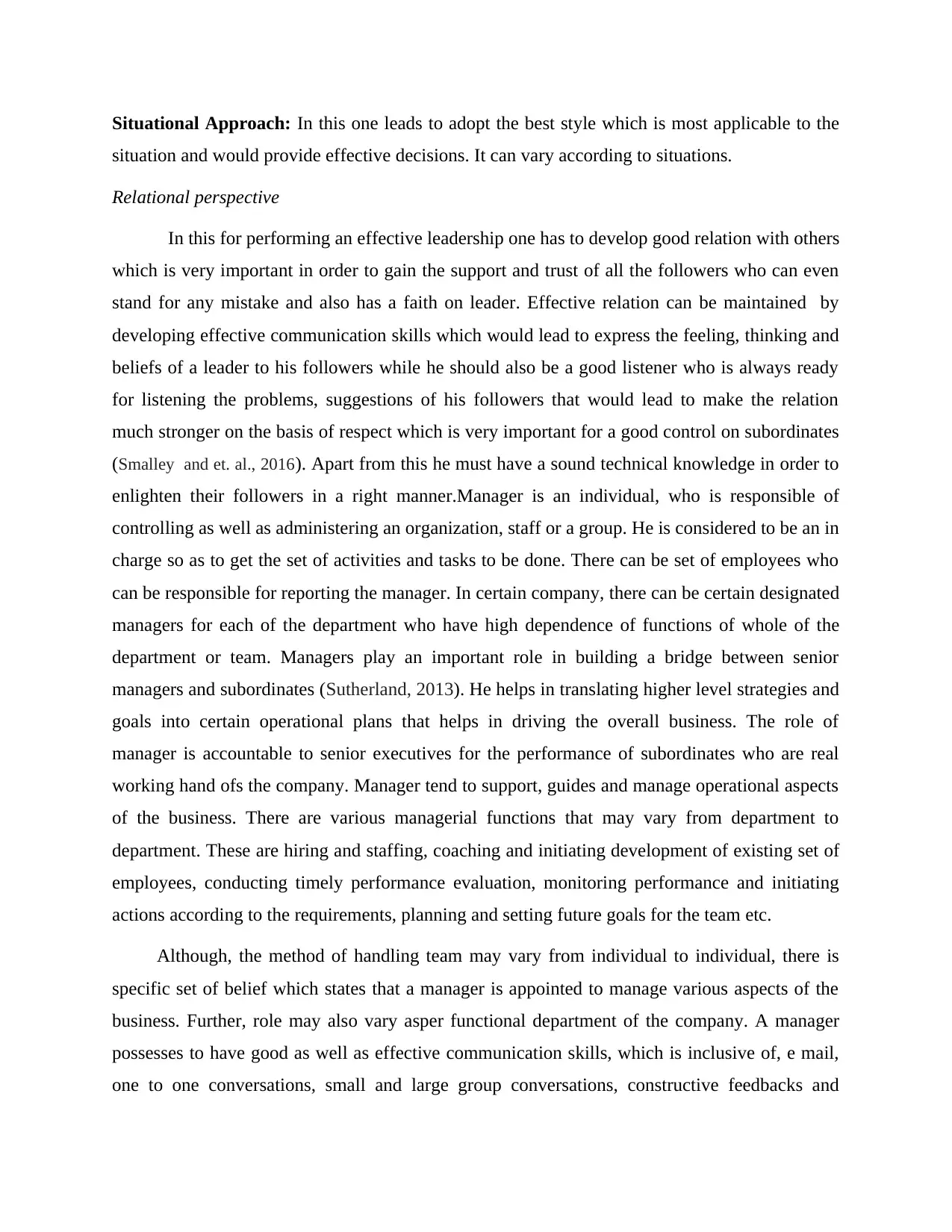
Situational Approach: In this one leads to adopt the best style which is most applicable to the
situation and would provide effective decisions. It can vary according to situations.
Relational perspective
In this for performing an effective leadership one has to develop good relation with others
which is very important in order to gain the support and trust of all the followers who can even
stand for any mistake and also has a faith on leader. Effective relation can be maintained by
developing effective communication skills which would lead to express the feeling, thinking and
beliefs of a leader to his followers while he should also be a good listener who is always ready
for listening the problems, suggestions of his followers that would lead to make the relation
much stronger on the basis of respect which is very important for a good control on subordinates
(Smalley and et. al., 2016). Apart from this he must have a sound technical knowledge in order to
enlighten their followers in a right manner.Manager is an individual, who is responsible of
controlling as well as administering an organization, staff or a group. He is considered to be an in
charge so as to get the set of activities and tasks to be done. There can be set of employees who
can be responsible for reporting the manager. In certain company, there can be certain designated
managers for each of the department who have high dependence of functions of whole of the
department or team. Managers play an important role in building a bridge between senior
managers and subordinates (Sutherland, 2013). He helps in translating higher level strategies and
goals into certain operational plans that helps in driving the overall business. The role of
manager is accountable to senior executives for the performance of subordinates who are real
working hand ofs the company. Manager tend to support, guides and manage operational aspects
of the business. There are various managerial functions that may vary from department to
department. These are hiring and staffing, coaching and initiating development of existing set of
employees, conducting timely performance evaluation, monitoring performance and initiating
actions according to the requirements, planning and setting future goals for the team etc.
Although, the method of handling team may vary from individual to individual, there is
specific set of belief which states that a manager is appointed to manage various aspects of the
business. Further, role may also vary asper functional department of the company. A manager
possesses to have good as well as effective communication skills, which is inclusive of, e mail,
one to one conversations, small and large group conversations, constructive feedbacks and
situation and would provide effective decisions. It can vary according to situations.
Relational perspective
In this for performing an effective leadership one has to develop good relation with others
which is very important in order to gain the support and trust of all the followers who can even
stand for any mistake and also has a faith on leader. Effective relation can be maintained by
developing effective communication skills which would lead to express the feeling, thinking and
beliefs of a leader to his followers while he should also be a good listener who is always ready
for listening the problems, suggestions of his followers that would lead to make the relation
much stronger on the basis of respect which is very important for a good control on subordinates
(Smalley and et. al., 2016). Apart from this he must have a sound technical knowledge in order to
enlighten their followers in a right manner.Manager is an individual, who is responsible of
controlling as well as administering an organization, staff or a group. He is considered to be an in
charge so as to get the set of activities and tasks to be done. There can be set of employees who
can be responsible for reporting the manager. In certain company, there can be certain designated
managers for each of the department who have high dependence of functions of whole of the
department or team. Managers play an important role in building a bridge between senior
managers and subordinates (Sutherland, 2013). He helps in translating higher level strategies and
goals into certain operational plans that helps in driving the overall business. The role of
manager is accountable to senior executives for the performance of subordinates who are real
working hand ofs the company. Manager tend to support, guides and manage operational aspects
of the business. There are various managerial functions that may vary from department to
department. These are hiring and staffing, coaching and initiating development of existing set of
employees, conducting timely performance evaluation, monitoring performance and initiating
actions according to the requirements, planning and setting future goals for the team etc.
Although, the method of handling team may vary from individual to individual, there is
specific set of belief which states that a manager is appointed to manage various aspects of the
business. Further, role may also vary asper functional department of the company. A manager
possesses to have good as well as effective communication skills, which is inclusive of, e mail,
one to one conversations, small and large group conversations, constructive feedbacks and
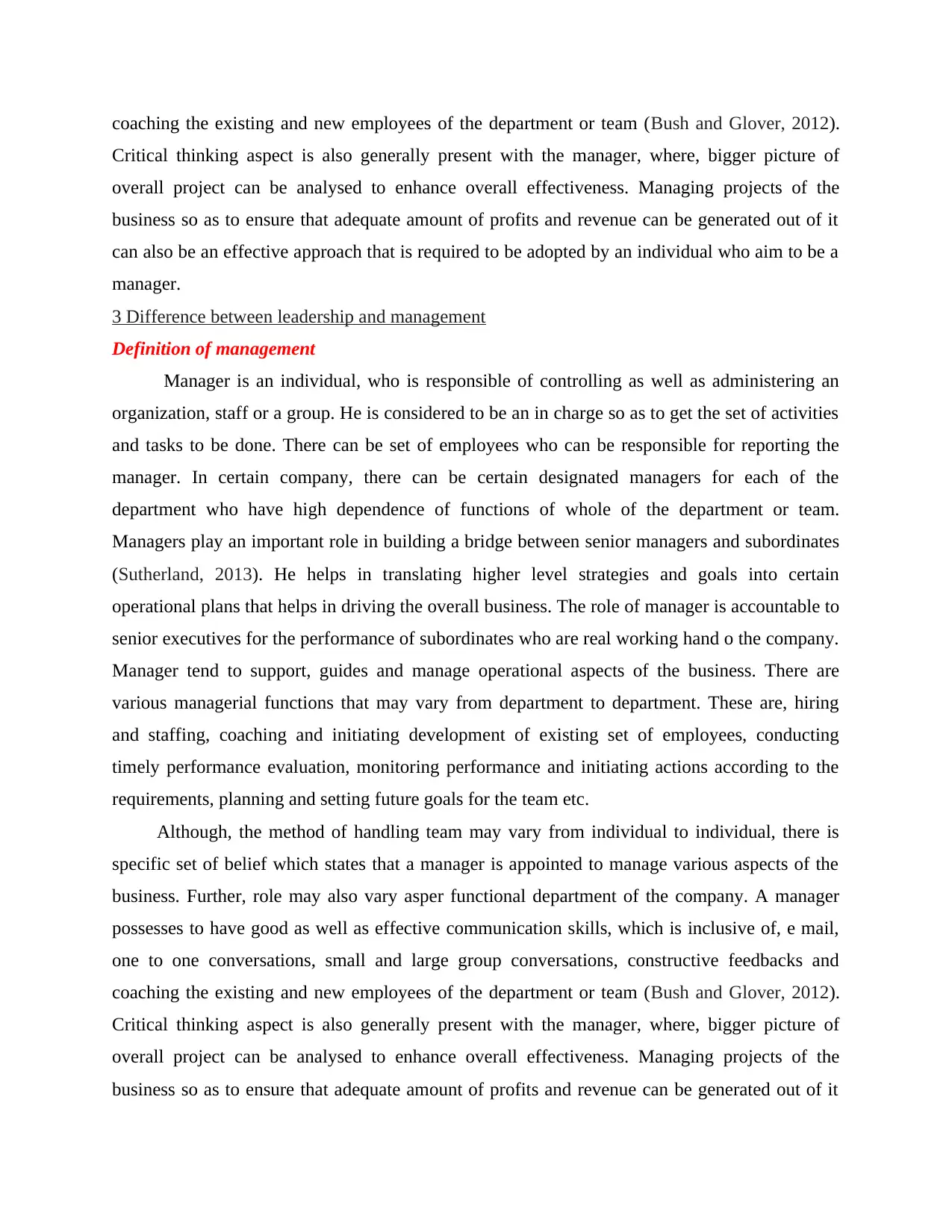
coaching the existing and new employees of the department or team (Bush and Glover, 2012).
Critical thinking aspect is also generally present with the manager, where, bigger picture of
overall project can be analysed to enhance overall effectiveness. Managing projects of the
business so as to ensure that adequate amount of profits and revenue can be generated out of it
can also be an effective approach that is required to be adopted by an individual who aim to be a
manager.
3 Difference between leadership and management
Definition of management
Manager is an individual, who is responsible of controlling as well as administering an
organization, staff or a group. He is considered to be an in charge so as to get the set of activities
and tasks to be done. There can be set of employees who can be responsible for reporting the
manager. In certain company, there can be certain designated managers for each of the
department who have high dependence of functions of whole of the department or team.
Managers play an important role in building a bridge between senior managers and subordinates
(Sutherland, 2013). He helps in translating higher level strategies and goals into certain
operational plans that helps in driving the overall business. The role of manager is accountable to
senior executives for the performance of subordinates who are real working hand o the company.
Manager tend to support, guides and manage operational aspects of the business. There are
various managerial functions that may vary from department to department. These are, hiring
and staffing, coaching and initiating development of existing set of employees, conducting
timely performance evaluation, monitoring performance and initiating actions according to the
requirements, planning and setting future goals for the team etc.
Although, the method of handling team may vary from individual to individual, there is
specific set of belief which states that a manager is appointed to manage various aspects of the
business. Further, role may also vary asper functional department of the company. A manager
possesses to have good as well as effective communication skills, which is inclusive of, e mail,
one to one conversations, small and large group conversations, constructive feedbacks and
coaching the existing and new employees of the department or team (Bush and Glover, 2012).
Critical thinking aspect is also generally present with the manager, where, bigger picture of
overall project can be analysed to enhance overall effectiveness. Managing projects of the
business so as to ensure that adequate amount of profits and revenue can be generated out of it
Critical thinking aspect is also generally present with the manager, where, bigger picture of
overall project can be analysed to enhance overall effectiveness. Managing projects of the
business so as to ensure that adequate amount of profits and revenue can be generated out of it
can also be an effective approach that is required to be adopted by an individual who aim to be a
manager.
3 Difference between leadership and management
Definition of management
Manager is an individual, who is responsible of controlling as well as administering an
organization, staff or a group. He is considered to be an in charge so as to get the set of activities
and tasks to be done. There can be set of employees who can be responsible for reporting the
manager. In certain company, there can be certain designated managers for each of the
department who have high dependence of functions of whole of the department or team.
Managers play an important role in building a bridge between senior managers and subordinates
(Sutherland, 2013). He helps in translating higher level strategies and goals into certain
operational plans that helps in driving the overall business. The role of manager is accountable to
senior executives for the performance of subordinates who are real working hand o the company.
Manager tend to support, guides and manage operational aspects of the business. There are
various managerial functions that may vary from department to department. These are, hiring
and staffing, coaching and initiating development of existing set of employees, conducting
timely performance evaluation, monitoring performance and initiating actions according to the
requirements, planning and setting future goals for the team etc.
Although, the method of handling team may vary from individual to individual, there is
specific set of belief which states that a manager is appointed to manage various aspects of the
business. Further, role may also vary asper functional department of the company. A manager
possesses to have good as well as effective communication skills, which is inclusive of, e mail,
one to one conversations, small and large group conversations, constructive feedbacks and
coaching the existing and new employees of the department or team (Bush and Glover, 2012).
Critical thinking aspect is also generally present with the manager, where, bigger picture of
overall project can be analysed to enhance overall effectiveness. Managing projects of the
business so as to ensure that adequate amount of profits and revenue can be generated out of it
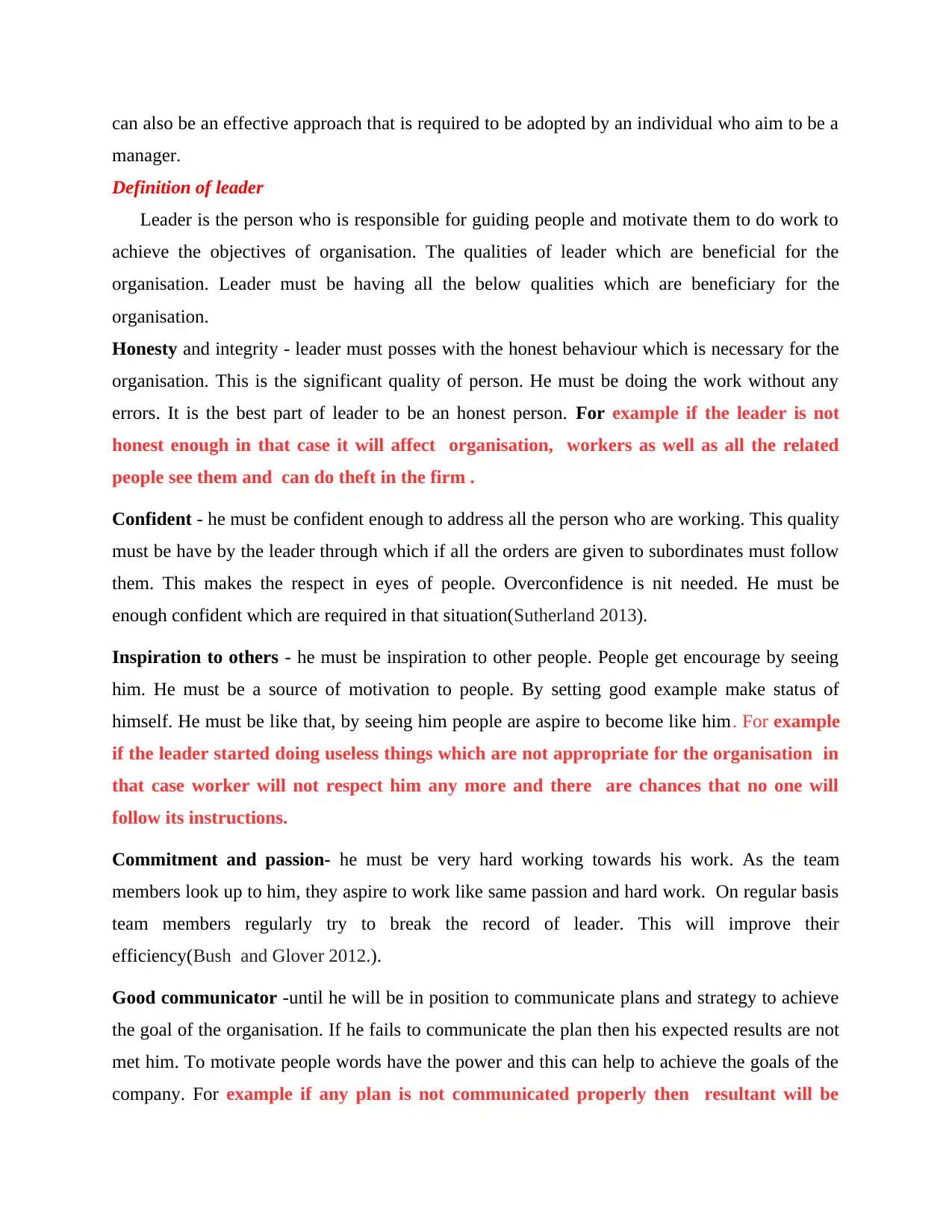
can also be an effective approach that is required to be adopted by an individual who aim to be a
manager.
Definition of leader
Leader is the person who is responsible for guiding people and motivate them to do work to
achieve the objectives of organisation. The qualities of leader which are beneficial for the
organisation. Leader must be having all the below qualities which are beneficiary for the
organisation.
Honesty and integrity - leader must posses with the honest behaviour which is necessary for the
organisation. This is the significant quality of person. He must be doing the work without any
errors. It is the best part of leader to be an honest person. For example if the leader is not
honest enough in that case it will affect organisation, workers as well as all the related
people see them and can do theft in the firm .
Confident - he must be confident enough to address all the person who are working. This quality
must be have by the leader through which if all the orders are given to subordinates must follow
them. This makes the respect in eyes of people. Overconfidence is nit needed. He must be
enough confident which are required in that situation(Sutherland 2013).
Inspiration to others - he must be inspiration to other people. People get encourage by seeing
him. He must be a source of motivation to people. By setting good example make status of
himself. He must be like that, by seeing him people are aspire to become like him. For example
if the leader started doing useless things which are not appropriate for the organisation in
that case worker will not respect him any more and there are chances that no one will
follow its instructions.
Commitment and passion- he must be very hard working towards his work. As the team
members look up to him, they aspire to work like same passion and hard work. On regular basis
team members regularly try to break the record of leader. This will improve their
efficiency(Bush and Glover 2012.).
Good communicator -until he will be in position to communicate plans and strategy to achieve
the goal of the organisation. If he fails to communicate the plan then his expected results are not
met him. To motivate people words have the power and this can help to achieve the goals of the
company. For example if any plan is not communicated properly then resultant will be
manager.
Definition of leader
Leader is the person who is responsible for guiding people and motivate them to do work to
achieve the objectives of organisation. The qualities of leader which are beneficial for the
organisation. Leader must be having all the below qualities which are beneficiary for the
organisation.
Honesty and integrity - leader must posses with the honest behaviour which is necessary for the
organisation. This is the significant quality of person. He must be doing the work without any
errors. It is the best part of leader to be an honest person. For example if the leader is not
honest enough in that case it will affect organisation, workers as well as all the related
people see them and can do theft in the firm .
Confident - he must be confident enough to address all the person who are working. This quality
must be have by the leader through which if all the orders are given to subordinates must follow
them. This makes the respect in eyes of people. Overconfidence is nit needed. He must be
enough confident which are required in that situation(Sutherland 2013).
Inspiration to others - he must be inspiration to other people. People get encourage by seeing
him. He must be a source of motivation to people. By setting good example make status of
himself. He must be like that, by seeing him people are aspire to become like him. For example
if the leader started doing useless things which are not appropriate for the organisation in
that case worker will not respect him any more and there are chances that no one will
follow its instructions.
Commitment and passion- he must be very hard working towards his work. As the team
members look up to him, they aspire to work like same passion and hard work. On regular basis
team members regularly try to break the record of leader. This will improve their
efficiency(Bush and Glover 2012.).
Good communicator -until he will be in position to communicate plans and strategy to achieve
the goal of the organisation. If he fails to communicate the plan then his expected results are not
met him. To motivate people words have the power and this can help to achieve the goals of the
company. For example if any plan is not communicated properly then resultant will be
Secure Best Marks with AI Grader
Need help grading? Try our AI Grader for instant feedback on your assignments.
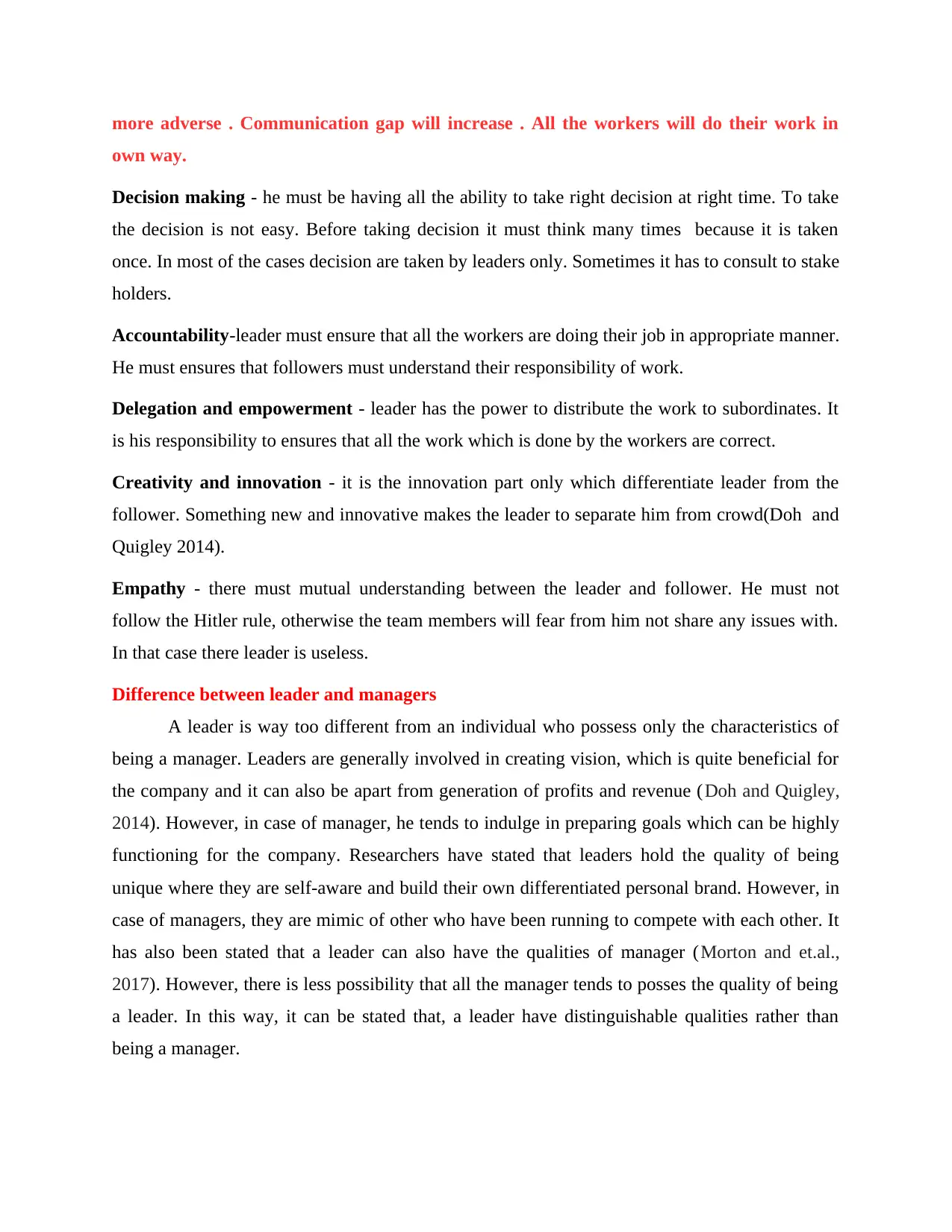
more adverse . Communication gap will increase . All the workers will do their work in
own way.
Decision making - he must be having all the ability to take right decision at right time. To take
the decision is not easy. Before taking decision it must think many times because it is taken
once. In most of the cases decision are taken by leaders only. Sometimes it has to consult to stake
holders.
Accountability-leader must ensure that all the workers are doing their job in appropriate manner.
He must ensures that followers must understand their responsibility of work.
Delegation and empowerment - leader has the power to distribute the work to subordinates. It
is his responsibility to ensures that all the work which is done by the workers are correct.
Creativity and innovation - it is the innovation part only which differentiate leader from the
follower. Something new and innovative makes the leader to separate him from crowd(Doh and
Quigley 2014).
Empathy - there must mutual understanding between the leader and follower. He must not
follow the Hitler rule, otherwise the team members will fear from him not share any issues with.
In that case there leader is useless.
Difference between leader and managers
A leader is way too different from an individual who possess only the characteristics of
being a manager. Leaders are generally involved in creating vision, which is quite beneficial for
the company and it can also be apart from generation of profits and revenue (Doh and Quigley,
2014). However, in case of manager, he tends to indulge in preparing goals which can be highly
functioning for the company. Researchers have stated that leaders hold the quality of being
unique where they are self-aware and build their own differentiated personal brand. However, in
case of managers, they are mimic of other who have been running to compete with each other. It
has also been stated that a leader can also have the qualities of manager (Morton and et.al.,
2017). However, there is less possibility that all the manager tends to posses the quality of being
a leader. In this way, it can be stated that, a leader have distinguishable qualities rather than
being a manager.
own way.
Decision making - he must be having all the ability to take right decision at right time. To take
the decision is not easy. Before taking decision it must think many times because it is taken
once. In most of the cases decision are taken by leaders only. Sometimes it has to consult to stake
holders.
Accountability-leader must ensure that all the workers are doing their job in appropriate manner.
He must ensures that followers must understand their responsibility of work.
Delegation and empowerment - leader has the power to distribute the work to subordinates. It
is his responsibility to ensures that all the work which is done by the workers are correct.
Creativity and innovation - it is the innovation part only which differentiate leader from the
follower. Something new and innovative makes the leader to separate him from crowd(Doh and
Quigley 2014).
Empathy - there must mutual understanding between the leader and follower. He must not
follow the Hitler rule, otherwise the team members will fear from him not share any issues with.
In that case there leader is useless.
Difference between leader and managers
A leader is way too different from an individual who possess only the characteristics of
being a manager. Leaders are generally involved in creating vision, which is quite beneficial for
the company and it can also be apart from generation of profits and revenue (Doh and Quigley,
2014). However, in case of manager, he tends to indulge in preparing goals which can be highly
functioning for the company. Researchers have stated that leaders hold the quality of being
unique where they are self-aware and build their own differentiated personal brand. However, in
case of managers, they are mimic of other who have been running to compete with each other. It
has also been stated that a leader can also have the qualities of manager (Morton and et.al.,
2017). However, there is less possibility that all the manager tends to posses the quality of being
a leader. In this way, it can be stated that, a leader have distinguishable qualities rather than
being a manager.
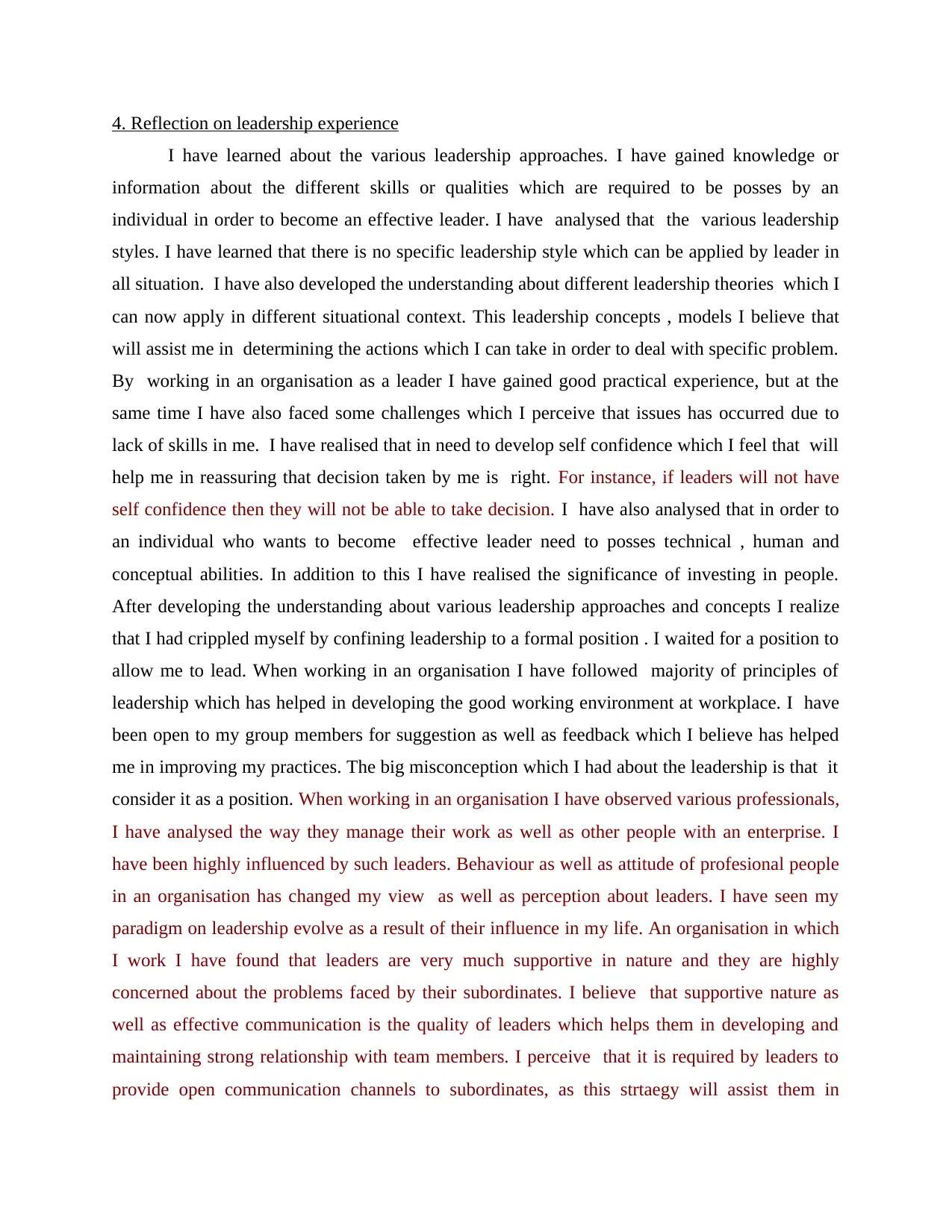
4. Reflection on leadership experience
I have learned about the various leadership approaches. I have gained knowledge or
information about the different skills or qualities which are required to be posses by an
individual in order to become an effective leader. I have analysed that the various leadership
styles. I have learned that there is no specific leadership style which can be applied by leader in
all situation. I have also developed the understanding about different leadership theories which I
can now apply in different situational context. This leadership concepts , models I believe that
will assist me in determining the actions which I can take in order to deal with specific problem.
By working in an organisation as a leader I have gained good practical experience, but at the
same time I have also faced some challenges which I perceive that issues has occurred due to
lack of skills in me. I have realised that in need to develop self confidence which I feel that will
help me in reassuring that decision taken by me is right. For instance, if leaders will not have
self confidence then they will not be able to take decision. I have also analysed that in order to
an individual who wants to become effective leader need to posses technical , human and
conceptual abilities. In addition to this I have realised the significance of investing in people.
After developing the understanding about various leadership approaches and concepts I realize
that I had crippled myself by confining leadership to a formal position . I waited for a position to
allow me to lead. When working in an organisation I have followed majority of principles of
leadership which has helped in developing the good working environment at workplace. I have
been open to my group members for suggestion as well as feedback which I believe has helped
me in improving my practices. The big misconception which I had about the leadership is that it
consider it as a position. When working in an organisation I have observed various professionals,
I have analysed the way they manage their work as well as other people with an enterprise. I
have been highly influenced by such leaders. Behaviour as well as attitude of profesional people
in an organisation has changed my view as well as perception about leaders. I have seen my
paradigm on leadership evolve as a result of their influence in my life. An organisation in which
I work I have found that leaders are very much supportive in nature and they are highly
concerned about the problems faced by their subordinates. I believe that supportive nature as
well as effective communication is the quality of leaders which helps them in developing and
maintaining strong relationship with team members. I perceive that it is required by leaders to
provide open communication channels to subordinates, as this strtaegy will assist them in
I have learned about the various leadership approaches. I have gained knowledge or
information about the different skills or qualities which are required to be posses by an
individual in order to become an effective leader. I have analysed that the various leadership
styles. I have learned that there is no specific leadership style which can be applied by leader in
all situation. I have also developed the understanding about different leadership theories which I
can now apply in different situational context. This leadership concepts , models I believe that
will assist me in determining the actions which I can take in order to deal with specific problem.
By working in an organisation as a leader I have gained good practical experience, but at the
same time I have also faced some challenges which I perceive that issues has occurred due to
lack of skills in me. I have realised that in need to develop self confidence which I feel that will
help me in reassuring that decision taken by me is right. For instance, if leaders will not have
self confidence then they will not be able to take decision. I have also analysed that in order to
an individual who wants to become effective leader need to posses technical , human and
conceptual abilities. In addition to this I have realised the significance of investing in people.
After developing the understanding about various leadership approaches and concepts I realize
that I had crippled myself by confining leadership to a formal position . I waited for a position to
allow me to lead. When working in an organisation I have followed majority of principles of
leadership which has helped in developing the good working environment at workplace. I have
been open to my group members for suggestion as well as feedback which I believe has helped
me in improving my practices. The big misconception which I had about the leadership is that it
consider it as a position. When working in an organisation I have observed various professionals,
I have analysed the way they manage their work as well as other people with an enterprise. I
have been highly influenced by such leaders. Behaviour as well as attitude of profesional people
in an organisation has changed my view as well as perception about leaders. I have seen my
paradigm on leadership evolve as a result of their influence in my life. An organisation in which
I work I have found that leaders are very much supportive in nature and they are highly
concerned about the problems faced by their subordinates. I believe that supportive nature as
well as effective communication is the quality of leaders which helps them in developing and
maintaining strong relationship with team members. I perceive that it is required by leaders to
provide open communication channels to subordinates, as this strtaegy will assist them in
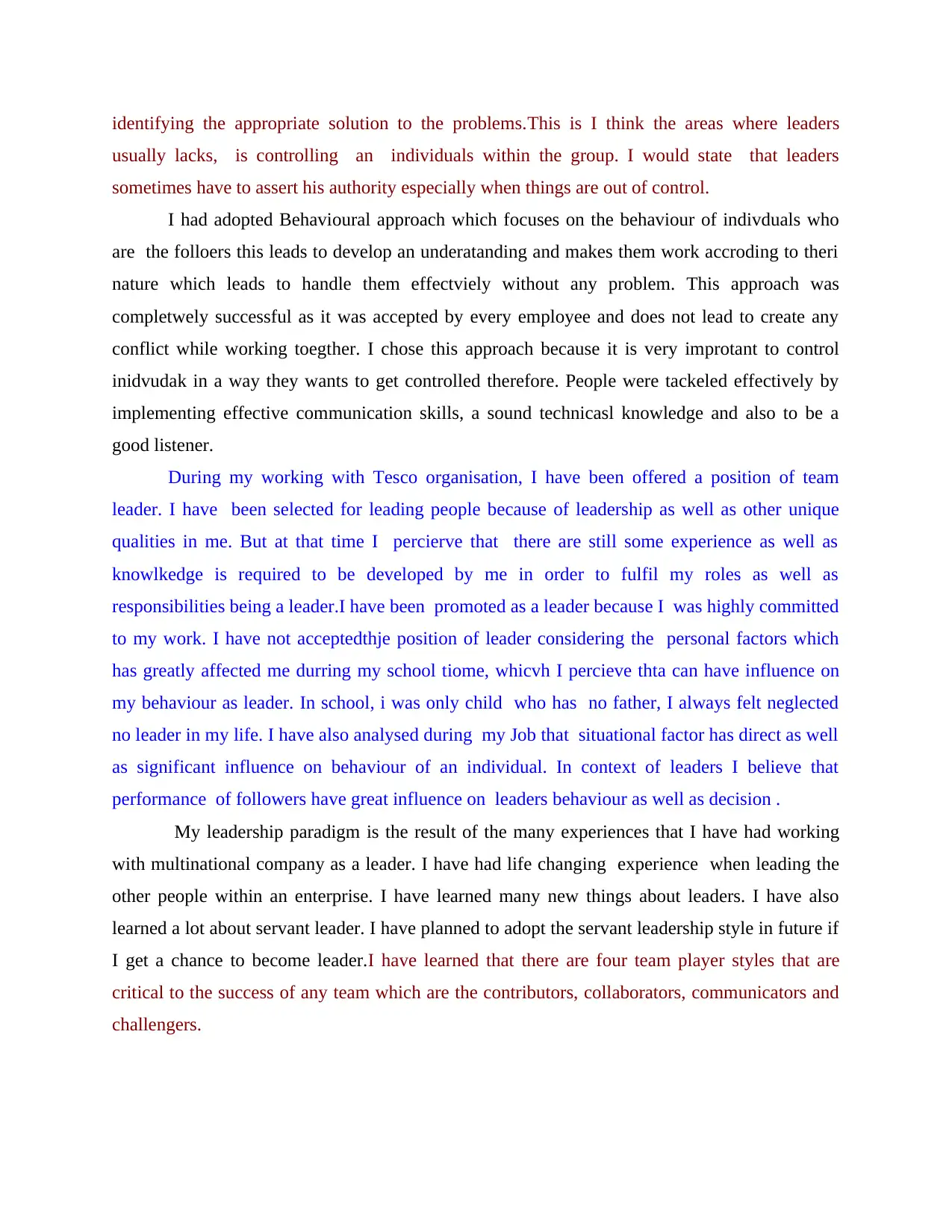
identifying the appropriate solution to the problems.This is I think the areas where leaders
usually lacks, is controlling an individuals within the group. I would state that leaders
sometimes have to assert his authority especially when things are out of control.
I had adopted Behavioural approach which focuses on the behaviour of indivduals who
are the folloers this leads to develop an underatanding and makes them work accroding to theri
nature which leads to handle them effectviely without any problem. This approach was
completwely successful as it was accepted by every employee and does not lead to create any
conflict while working toegther. I chose this approach because it is very improtant to control
inidvudak in a way they wants to get controlled therefore. People were tackeled effectively by
implementing effective communication skills, a sound technicasl knowledge and also to be a
good listener.
During my working with Tesco organisation, I have been offered a position of team
leader. I have been selected for leading people because of leadership as well as other unique
qualities in me. But at that time I percierve that there are still some experience as well as
knowlkedge is required to be developed by me in order to fulfil my roles as well as
responsibilities being a leader.I have been promoted as a leader because I was highly committed
to my work. I have not acceptedthje position of leader considering the personal factors which
has greatly affected me durring my school tiome, whicvh I percieve thta can have influence on
my behaviour as leader. In school, i was only child who has no father, I always felt neglected
no leader in my life. I have also analysed during my Job that situational factor has direct as well
as significant influence on behaviour of an individual. In context of leaders I believe that
performance of followers have great influence on leaders behaviour as well as decision .
My leadership paradigm is the result of the many experiences that I have had working
with multinational company as a leader. I have had life changing experience when leading the
other people within an enterprise. I have learned many new things about leaders. I have also
learned a lot about servant leader. I have planned to adopt the servant leadership style in future if
I get a chance to become leader.I have learned that there are four team player styles that are
critical to the success of any team which are the contributors, collaborators, communicators and
challengers.
usually lacks, is controlling an individuals within the group. I would state that leaders
sometimes have to assert his authority especially when things are out of control.
I had adopted Behavioural approach which focuses on the behaviour of indivduals who
are the folloers this leads to develop an underatanding and makes them work accroding to theri
nature which leads to handle them effectviely without any problem. This approach was
completwely successful as it was accepted by every employee and does not lead to create any
conflict while working toegther. I chose this approach because it is very improtant to control
inidvudak in a way they wants to get controlled therefore. People were tackeled effectively by
implementing effective communication skills, a sound technicasl knowledge and also to be a
good listener.
During my working with Tesco organisation, I have been offered a position of team
leader. I have been selected for leading people because of leadership as well as other unique
qualities in me. But at that time I percierve that there are still some experience as well as
knowlkedge is required to be developed by me in order to fulfil my roles as well as
responsibilities being a leader.I have been promoted as a leader because I was highly committed
to my work. I have not acceptedthje position of leader considering the personal factors which
has greatly affected me durring my school tiome, whicvh I percieve thta can have influence on
my behaviour as leader. In school, i was only child who has no father, I always felt neglected
no leader in my life. I have also analysed during my Job that situational factor has direct as well
as significant influence on behaviour of an individual. In context of leaders I believe that
performance of followers have great influence on leaders behaviour as well as decision .
My leadership paradigm is the result of the many experiences that I have had working
with multinational company as a leader. I have had life changing experience when leading the
other people within an enterprise. I have learned many new things about leaders. I have also
learned a lot about servant leader. I have planned to adopt the servant leadership style in future if
I get a chance to become leader.I have learned that there are four team player styles that are
critical to the success of any team which are the contributors, collaborators, communicators and
challengers.
Paraphrase This Document
Need a fresh take? Get an instant paraphrase of this document with our AI Paraphraser
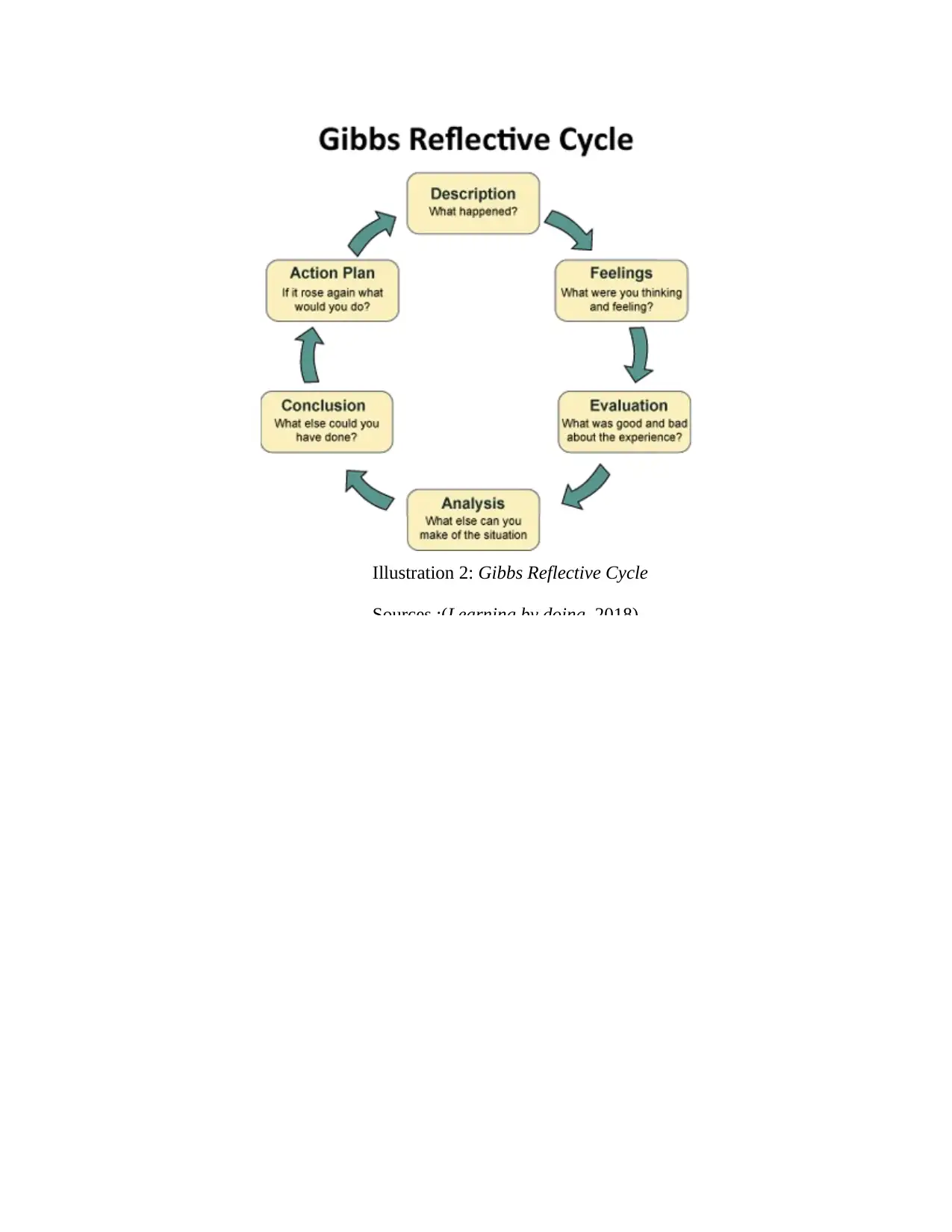
Illustration 2: Gibbs Reflective Cycle
Sources :(Learning by doing, 2018)
Sources :(Learning by doing, 2018)
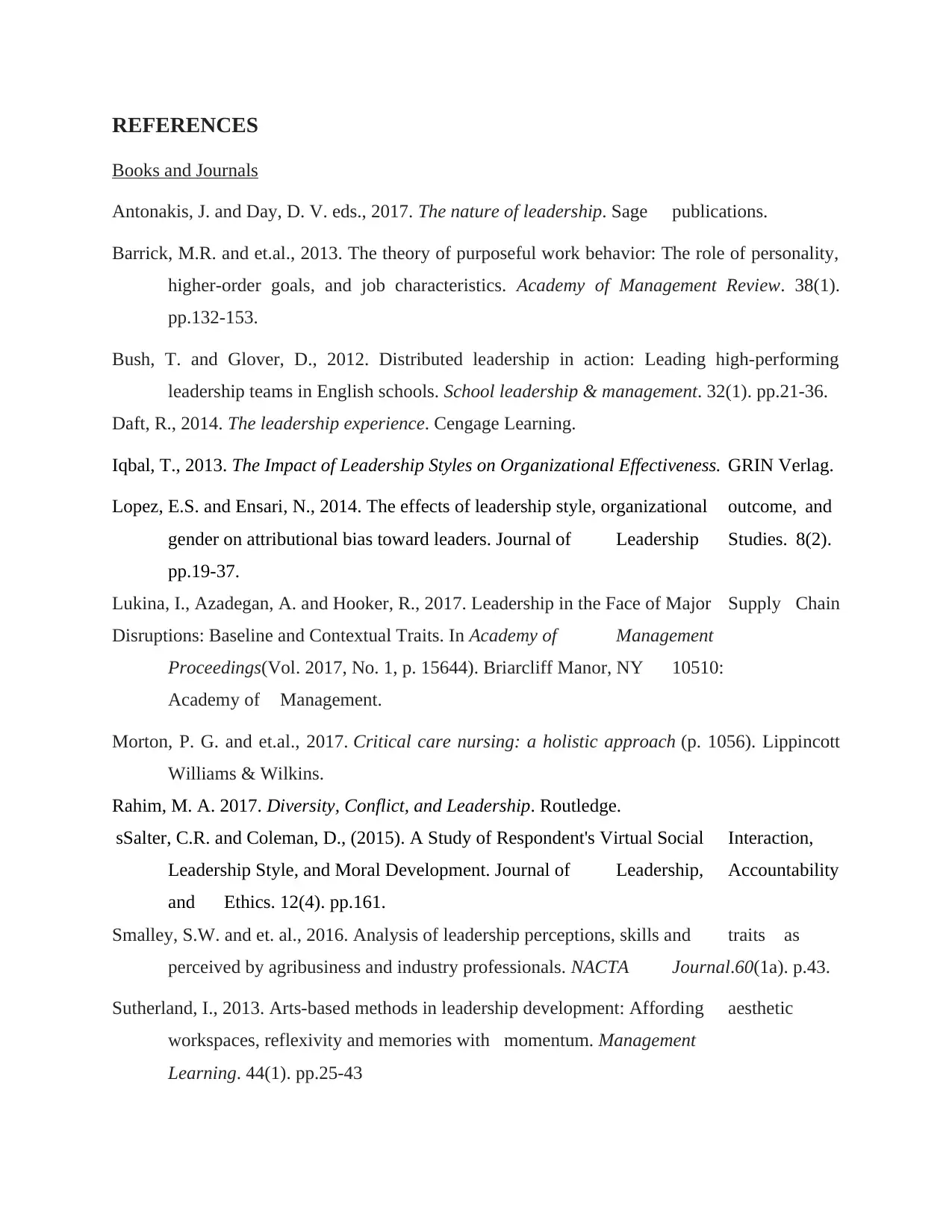
REFERENCES
Books and Journals
Antonakis, J. and Day, D. V. eds., 2017. The nature of leadership. Sage publications.
Barrick, M.R. and et.al., 2013. The theory of purposeful work behavior: The role of personality,
higher-order goals, and job characteristics. Academy of Management Review. 38(1).
pp.132-153.
Bush, T. and Glover, D., 2012. Distributed leadership in action: Leading high-performing
leadership teams in English schools. School leadership & management. 32(1). pp.21-36.
Daft, R., 2014. The leadership experience. Cengage Learning.
Iqbal, T., 2013. The Impact of Leadership Styles on Organizational Effectiveness. GRIN Verlag.
Lopez, E.S. and Ensari, N., 2014. The effects of leadership style, organizational outcome, and
gender on attributional bias toward leaders. Journal of Leadership Studies. 8(2).
pp.19-37.
Lukina, I., Azadegan, A. and Hooker, R., 2017. Leadership in the Face of Major Supply Chain
Disruptions: Baseline and Contextual Traits. In Academy of Management
Proceedings(Vol. 2017, No. 1, p. 15644). Briarcliff Manor, NY 10510:
Academy of Management.
Morton, P. G. and et.al., 2017. Critical care nursing: a holistic approach (p. 1056). Lippincott
Williams & Wilkins.
Rahim, M. A. 2017. Diversity, Conflict, and Leadership. Routledge.
sSalter, C.R. and Coleman, D., (2015). A Study of Respondent's Virtual Social Interaction,
Leadership Style, and Moral Development. Journal of Leadership, Accountability
and Ethics. 12(4). pp.161.
Smalley, S.W. and et. al., 2016. Analysis of leadership perceptions, skills and traits as
perceived by agribusiness and industry professionals. NACTA Journal.60(1a). p.43.
Sutherland, I., 2013. Arts-based methods in leadership development: Affording aesthetic
workspaces, reflexivity and memories with momentum. Management
Learning. 44(1). pp.25-43
Books and Journals
Antonakis, J. and Day, D. V. eds., 2017. The nature of leadership. Sage publications.
Barrick, M.R. and et.al., 2013. The theory of purposeful work behavior: The role of personality,
higher-order goals, and job characteristics. Academy of Management Review. 38(1).
pp.132-153.
Bush, T. and Glover, D., 2012. Distributed leadership in action: Leading high-performing
leadership teams in English schools. School leadership & management. 32(1). pp.21-36.
Daft, R., 2014. The leadership experience. Cengage Learning.
Iqbal, T., 2013. The Impact of Leadership Styles on Organizational Effectiveness. GRIN Verlag.
Lopez, E.S. and Ensari, N., 2014. The effects of leadership style, organizational outcome, and
gender on attributional bias toward leaders. Journal of Leadership Studies. 8(2).
pp.19-37.
Lukina, I., Azadegan, A. and Hooker, R., 2017. Leadership in the Face of Major Supply Chain
Disruptions: Baseline and Contextual Traits. In Academy of Management
Proceedings(Vol. 2017, No. 1, p. 15644). Briarcliff Manor, NY 10510:
Academy of Management.
Morton, P. G. and et.al., 2017. Critical care nursing: a holistic approach (p. 1056). Lippincott
Williams & Wilkins.
Rahim, M. A. 2017. Diversity, Conflict, and Leadership. Routledge.
sSalter, C.R. and Coleman, D., (2015). A Study of Respondent's Virtual Social Interaction,
Leadership Style, and Moral Development. Journal of Leadership, Accountability
and Ethics. 12(4). pp.161.
Smalley, S.W. and et. al., 2016. Analysis of leadership perceptions, skills and traits as
perceived by agribusiness and industry professionals. NACTA Journal.60(1a). p.43.
Sutherland, I., 2013. Arts-based methods in leadership development: Affording aesthetic
workspaces, reflexivity and memories with momentum. Management
Learning. 44(1). pp.25-43
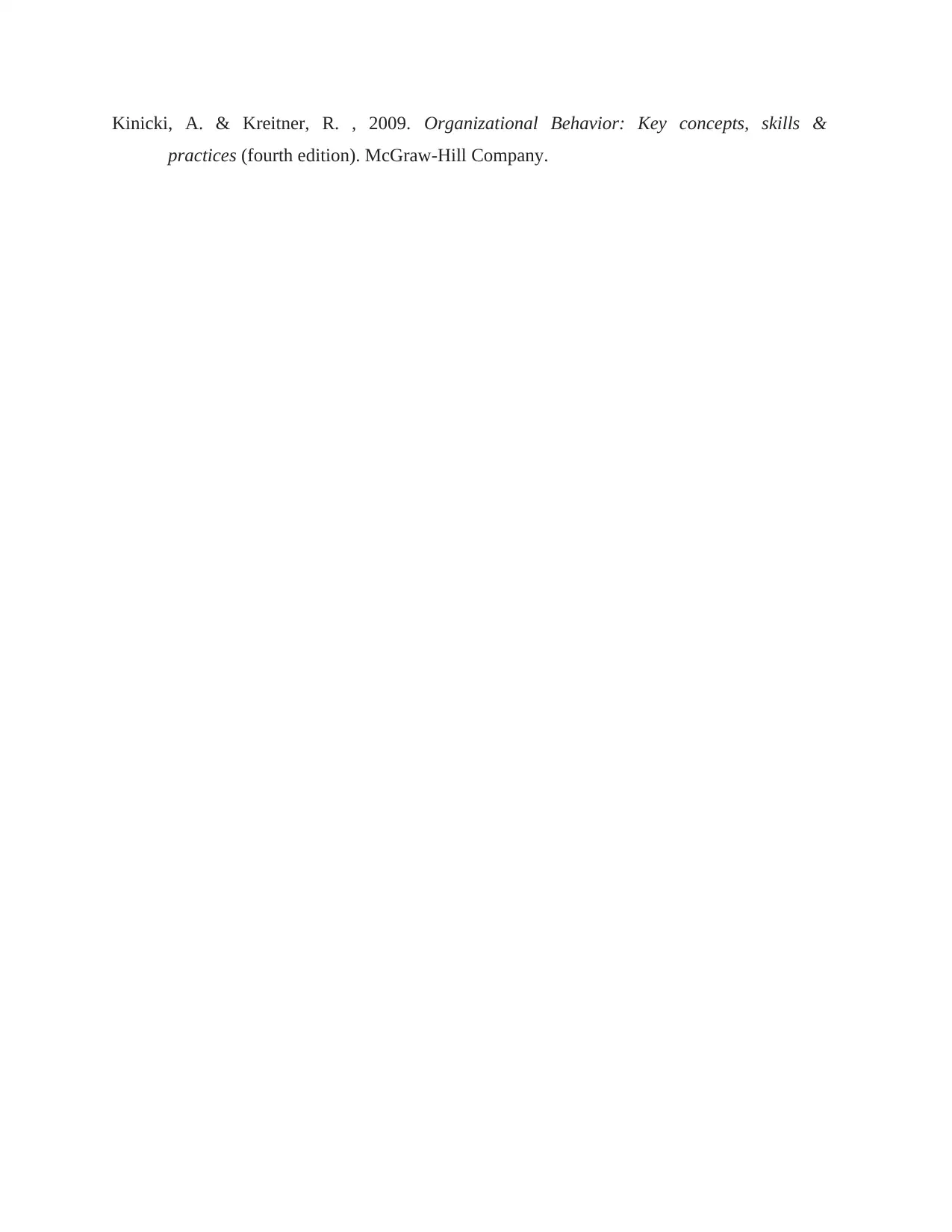
Kinicki, A. & Kreitner, R. , 2009. Organizational Behavior: Key concepts, skills &
practices (fourth edition). McGraw-Hill Company.
practices (fourth edition). McGraw-Hill Company.
1 out of 16
Related Documents
Your All-in-One AI-Powered Toolkit for Academic Success.
+13062052269
info@desklib.com
Available 24*7 on WhatsApp / Email
![[object Object]](/_next/static/media/star-bottom.7253800d.svg)
Unlock your academic potential
© 2024 | Zucol Services PVT LTD | All rights reserved.





